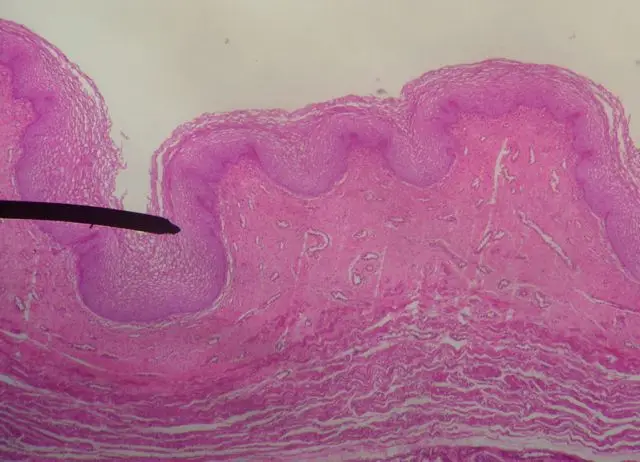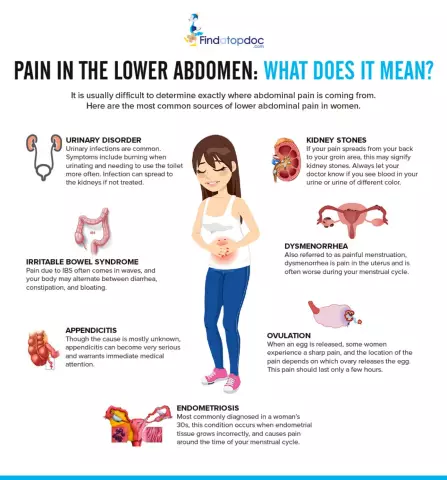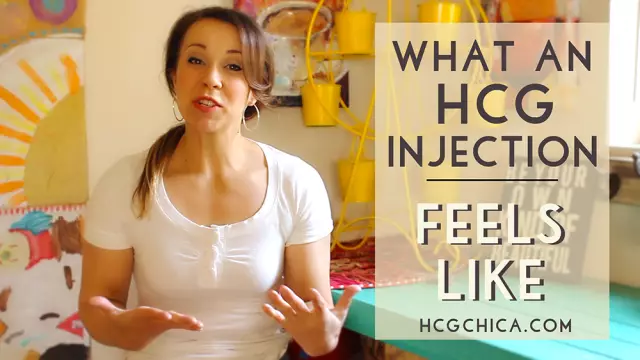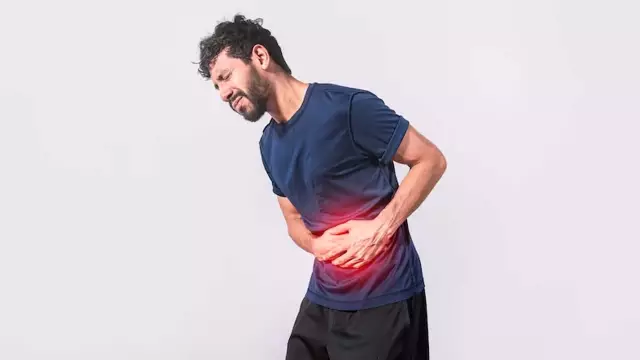- Author Rachel Wainwright wainwright@abchealthonline.com.
- Public 2023-12-15 07:39.
- Last modified 2025-11-02 20:14.
Lower abdomen during pregnancy

Often, women experience pain, tingling, or simply aching in the lower abdomen during pregnancy. Gynecologists advise seeking medical help for any alarming symptoms, since some of them really pose a threat to the health of the unborn baby and his mother. However, before raising a panic, let's figure out why unpleasant sensations arise and what they are associated with.
Pain and cramps in the lower abdomen during pregnancy
As you may have guessed, discomfort is not always associated with bearing a fetus. From this point of view, pain is divided into obstetric and non-obstetric.
Non-obstetric pains are those that do not threaten the life and health of the fetus. They can occur for completely natural reasons, including those indirectly related to pregnancy. For example, the discomfort caused by the stretching of the ligaments and muscles that support the uterus, which is constantly increasing in size. The larger the genital organ, the greater the load on them. In this case, tingling in the lower abdomen during pregnancy, as well as sharp or aching pain may occur. As a rule, discomfort is observed on one or both sides of the abdomen and does not last long. When the ligaments and muscles are stretched, the pain starts in the groin and then spreads to the outer thighs along the bikini line.
The second physiological reason for the feeling that the lower abdomen aches during pregnancy is a quick change in position. Sharp pain occurs when you cough, get out of bed or get out of the bathroom, it can appear if you are walking or trying to run for a long time. The third natural cause of discomfort is that the baby's head sinks into the pelvis later in life. In this case, the lower abdomen aches and pulls during pregnancy due to sprains.
Why is this happening? The fact is that during preparation for childbirth, a large amount of relaxin is produced in a woman's body, a hormone that affects the elasticity of tissues, including the opening of the cervix.
To ease the feeling of cramps in the lower abdomen during pregnancy for natural reasons, it is not necessary to consult a doctor, it is enough to provide yourself with good rest. This will help the position of "standing on all fours", rest in a warm bath, and in some cases - a bandage or elastic bandage, which relieve stress from the abdominal muscles.
In addition, there are a number of non-obstetric pain causes that require medical attention. These include appendicitis and intestinal obstruction, and urinary tract infections. In these cases, tingling in the lower abdomen during pregnancy will be accompanied by an increase in temperature, weakness, nausea, poor health, and in the case of cystitis - cramps during urination.
Obstetric pains include those alarming symptoms that are associated with bearing a fetus. And in this case, in order to diagnose abnormalities, you need to pay attention to the duration of pregnancy, as well as to the accompanying symptoms. Let's analyze them in more detail.
The lower abdomen aches during pregnancy - early stages
Obstetric pain at the very beginning of the first trimester may indicate such a serious pathology as the development of an ectopic pregnancy. When the ovum is fixed in the wrong place, a tubal abortion may occur - in this case, the body gets rid of the ovum. In this case, cramps occur in the lower abdomen during pregnancy, similar to contractions. As a rule, they are felt only on one side and are accompanied by a small spotting.
A more serious threat is the rupture of the fallopian tube, which can occur at 8-12 weeks. In this case, during pregnancy, the lower abdomen pulls, there are severe cramping pains that radiate to the rectum, hypochondrium, supraclavicular region and legs. The pain is so severe that the woman may faint. The situation is complicated by internal bleeding.
In some cases, tingling in the lower abdomen during pregnancy becomes a sign of an incipient miscarriage. This may additionally be indicated by the hardness of the peritoneum, lumbar and pubic pain, a feeling of petrification of the uterus and bloody discharge (initially brownish, and then brightly scarlet). When diagnosed, a gynecologist can detect a shortening of the cervix. With smearing discharge, the child can often be saved.
Tingling and throbbing in the lower abdomen during pregnancy
One of the common reasons that pulls the lower abdomen during pregnancy, starting from the second trimester, is premature placental abruption, which mainly threatens the health of the fetus.
In the event of partial detachment, pregnancy can still be maintained, even if bleeding occurs. For the fetus, a situation is considered dangerous when a quarter of the placenta area or more is separated. A woman needs to seek medical help as soon as possible and continue to remain in bed, usually in a hospital, until the threat of miscarriage passes.

In addition to bleeding, this pathological condition is additionally indicated by symptoms such as a tense and slightly painful uterus and cardiac disorders in the fetus. In severe placental abruption, pain in the lower abdomen is usually strong and bursting, accompanied by bleeding, dizziness, weakness, and a decrease in blood pressure and body temperature. The uterus is tense and asymmetrical.
Some expectant mothers notice pulsations in the lower abdomen during pregnancy. Sometimes this feeling is mistaken for the movements and hiccups of the future baby. If the latter almost does not cause inconvenience (it is felt when the fetus is already quite large), then the movements of the crumbs are sometimes very noticeable. But still, in the later stages, the pulsation in the lower abdomen during pregnancy sometimes indicates a syndrome of compression of the inferior vena cava. The fact is that after 25 weeks, the growing uterus puts pressure on the lower abdomen, including the vena cava. This, in turn, interferes with the transport of venous blood and can cause discomfort, dizziness, nausea, and loss of consciousness. To avoid this, it is enough not to lie on your back, starting in the middle of the second trimester.
However, the longer the period, the less anxiety is caused by the lower abdomen during pregnancy. A pulling sensation after 38 weeks may indicate the onset of labor. In this case, the only thing that is required of the expectant mother is to collect documents and necessary things, take a shower and go to the hospital.
YouTube video related to the article:
Found a mistake in the text? Select it and press Ctrl + Enter.






